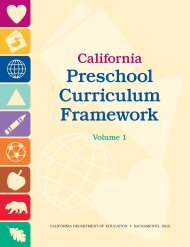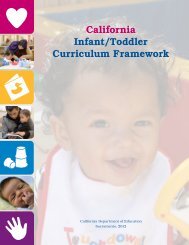California Preschool Learning Foundations - ECEZero2Three ...
California Preschool Learning Foundations - ECEZero2Three ...
California Preschool Learning Foundations - ECEZero2Three ...
You also want an ePaper? Increase the reach of your titles
YUMPU automatically turns print PDFs into web optimized ePapers that Google loves.
Vocabulary. The development of<br />
vocabulary is one of the most essential,<br />
observable, and robust aspects of<br />
early language acquisition. Vocabulary<br />
knowledge is an important language<br />
tool that children use to access background<br />
knowledge, express ideas, and<br />
acquire new concepts. In addition to<br />
providing children with a tool that<br />
supports peer relationships and their<br />
interactions with adults, the size of a<br />
child’s vocabulary is itself a positive<br />
influence on word learning. Children<br />
who have a larger vocabulary have<br />
an easier time acquiring new words<br />
(Nash and Donaldson 2005; Sénéchal,<br />
Thomas, and Monker 1995). They also<br />
tend to be more effective readers, mastering<br />
a wider variety of strategies to<br />
figure out the meaning of new words<br />
than less capable readers can (McKeown<br />
1985), and are more proficient<br />
in reading comprehension (Report of<br />
the National Reading Panel 2000). On<br />
the contrary, preschool and kindergarten<br />
children who show difficulties<br />
with vocabulary exhibit relatively lower<br />
reading achievement later (Cunningham<br />
and Stanovich 1998; Share and<br />
others 1984; Stanovich, Cunningham,<br />
and Freeman 1984). The differences<br />
in vocabulary words between high and<br />
low achievers are stable over time.<br />
Vocabulary growth throughout early<br />
childhood occurs at a very rapid rate.<br />
This process continues throughout<br />
school, where children acquire from<br />
3,000 to 5,000 new words each academic<br />
year, with about half of those<br />
words learned through reading (Nagy<br />
and Herman 1987). It is thus important<br />
to pay attention to vocabulary<br />
development from an early age. The<br />
vocabulary substrand includes three<br />
interrelated foundations: age-appropriate<br />
vocabulary, basic concepts, and<br />
<strong>California</strong> Department of Education • <strong>Preschool</strong> <strong>Learning</strong> <strong>Foundations</strong>, Volume 1<br />
73<br />
vocabulary that describes relations<br />
between objects.<br />
Vocabulary undergoes rapid growth<br />
during the preschool years. Many children<br />
enter into a period termed the<br />
“vocabulary explosion” or “word spurt”<br />
within the second year of life (Bates,<br />
Bretherton, and Snyder 1988). Vocabulary<br />
acquisition is not merely adding<br />
new words in a serial fashion to a<br />
static and established vocabulary base.<br />
<strong>Learning</strong> new vocabulary is a more<br />
complex process that involves altering<br />
and refining the semantic representation<br />
of words already in the children’s<br />
vocabulary base, as well as the relationships<br />
among them (Landauer and<br />
Dumais 1997; Woodward, Markham,<br />
and Fitzsimmons 1994). Children’s<br />
development of the meaning of a single<br />
word is best viewed as a gradual process<br />
in which word representations<br />
progressively develop from immature,<br />
incomplete representations to mature,<br />
accurate representations (Justice,<br />
Meier, and Walpole 2005). Children<br />
often can acquire a general representation<br />
of a new word with only a single<br />
exposure through a process called<br />
“fast mapping” (see McGregor and others<br />
2002). This process is followed by<br />
“slow mapping,” during which representations<br />
are gradually refined over<br />
time with multiple exposures (Curtis<br />
1987). Thus, multiple experiences with<br />
words across a variety of contexts are<br />
critical for children’s acquisition of a<br />
fine-grained representation of those<br />
words.<br />
An important aspect of early vocabulary<br />
and linguistic concept development<br />
is that of “categorization” (Hoff<br />
2005). “Vocabulary development”<br />
can be defined as the child’s ongoing<br />
achievement of increasingly precise<br />
ways of representing the contents of<br />
LANGUAGE AND LITERACY
















